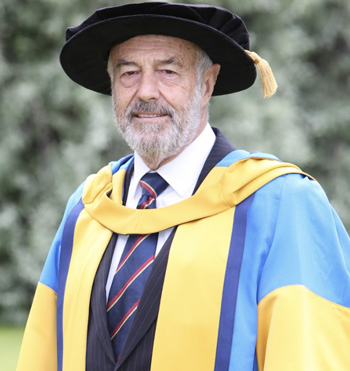John Hearn
UNIVERSITY COLLEGE DUBLIN
HONORARY CONFERRING
Tuesday, 16 June 2015 at 11.30 a.m.
TEXT OF THE INTRODUCTORY ADDRESS DELIVERED BY PROFESSOR TOM BOLGER on 16 June 2015, on the occasion of the conferring of the Degree of Doctor of Science, honoris causa on JOHN HEARN
President, Honoured Guests, Ladies and Gentlemen.
 Born in India and raised in Kenya, Professor John Hearn was awarded a 1st honours BSc and MSc in Zoology from University College Dublin. He worked in the area of Developmental Biology using Xenopus and salmon as his model organisms. He speaks of those days in Zoology with great affection, not least because he met his wife, Margaret McNair, while studying here 50 years ago. He has told me in our recent discussions that this early theoretical and practical training in cell development set the basis for his PhD, at the Australian National University, and early research career in developmental embryology and the “biology of shape” which led to stem cell biology an area which his lab was engaged in during the early 1980s long before it became fashionable. He was recruited to the USA to build and lead a team that would isolate primate and human stem cells which he did successfully.
Born in India and raised in Kenya, Professor John Hearn was awarded a 1st honours BSc and MSc in Zoology from University College Dublin. He worked in the area of Developmental Biology using Xenopus and salmon as his model organisms. He speaks of those days in Zoology with great affection, not least because he met his wife, Margaret McNair, while studying here 50 years ago. He has told me in our recent discussions that this early theoretical and practical training in cell development set the basis for his PhD, at the Australian National University, and early research career in developmental embryology and the “biology of shape” which led to stem cell biology an area which his lab was engaged in during the early 1980s long before it became fashionable. He was recruited to the USA to build and lead a team that would isolate primate and human stem cells which he did successfully.
John Hearn’s research, teaching and mentorship have concentrated on basic questions in biology and how they apply to biomedicine and to conservation. He is a reproductive and developmental physiologist who has worked with species such as kangaroos, pandas and primates, species with which many young zoologists dream of working. He has published more than 220 research papers and six edited books on human and animal fertility, stem cell biology and biotechnology. In recent years his research has been on the science and ethics of stem cell biology, and on reform in international higher education.
During his career he has served as a researcher, educator and director of national and international programs, having spent periods at the Universities of Edinburgh, London UCL, Wisconsin-Madison, the ANU and University of Sydney. He has been a Senior Scientific Adviser to the World Health Organisation and the World Wildlife Fund.
In conjunction with these appointments, he was Director of Science of the Zoological Society of London 1980-87; Deputy Secretary of the Agricultural and Food Research Council of the UK 1987-90; and Director of the Wisconsin National Primate Research Centre 1990-96. He was elected President of the International Primatological Society (1984-8) and of the Society for Reproductive Biology (2001-4).
In Australia he has been a board member of the Australian Nuclear Science and Technology Organisation (ANSTO); Chairman of the Australian Biotechnology Advisory Council (ABAC) to Federal Government (2002-5); Scientific Adviser to the Australian House of Representatives Committee on cloning and stem cell research (1999-2001); co-founder of the Australian Centre for Intellectual Property and the Greenhouse Accounting Cooperative Research Centre; and deputy Director of the Pest Animal Control CRC.
He holds the Scientific Medal of the Zoological Society of London; the Osman-Hill medal of the Primate Society of Great Britain; and the Australian Centenary Medal “for outstanding service to science and to the Australian Government as a scientific adviser”.
In recent years he has concentrated his efforts on developments in higher education, not alone in Australia but with an outward focus. He is Executive Director of the Worldwide Universities Network since 2009; Chairman of the Australia Africa Universities Network since 2011. He was Vice nt (Academic and International) of the University of Sydney 2004-13; Vice President (Research) of the Australian National University (2001-4); and Director, ANU Research School of Biological Sciences (1998-2001).
His leadership and administrative positions have strived to build world class teams in areas of significant global challenge, create opportunities for emerging and established researchers; and support his colleagues to attain their own ambitions, professorships and paths. He is still doing this with international networks, which he considers to be the experimental laboratories of internationalisation and international engagement. He believes that it is essential that we reduce the knowledge gap between developed and developing economies and their universities.
A committed international citizen, he has directed research and capacity development programmes in Kenya, Brazil, China, Thailand and India.
He is a member of the British Council’s Global Education Advisory Group, and an adviser to the Swedish Foundation for International Cooperation. Until 2014 he served on the OECD Internationalisation of Higher Education Group; Innovation, Higher Education and Research in Development Group; and previously the Futures Group on the Bio-economy 2030. He has also been Chairman of the Board, Sydney Confucius Institute.
Professor John Hearn is therefore an alumus of which UCD can be proud, a world class scientist and advocate and a leader in the development of higher education internationally.
Praehonorabilis Praeses, totaque Universitas,
Praesento vobis hunc meum filium, quem scio tam moribus quam doctrina habilem et idoneum esse qui admittatur, honoris causa, ad Gradum Doctoratus Scientiae; idque tibi fide mea testor ac spondeo, totique Academiae.